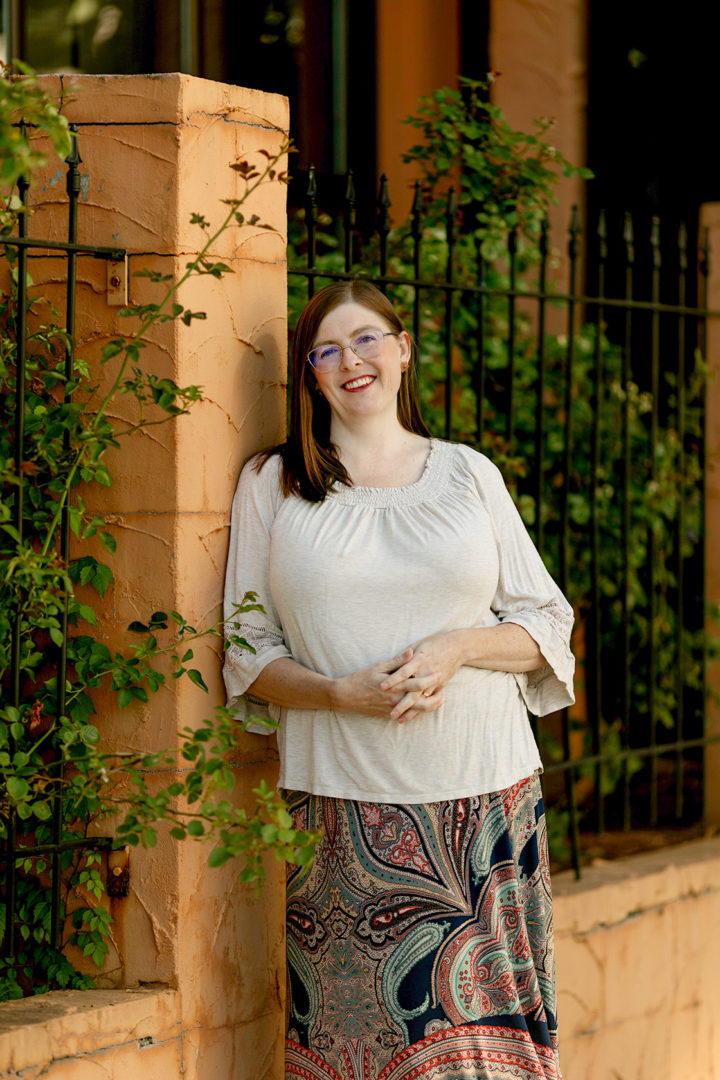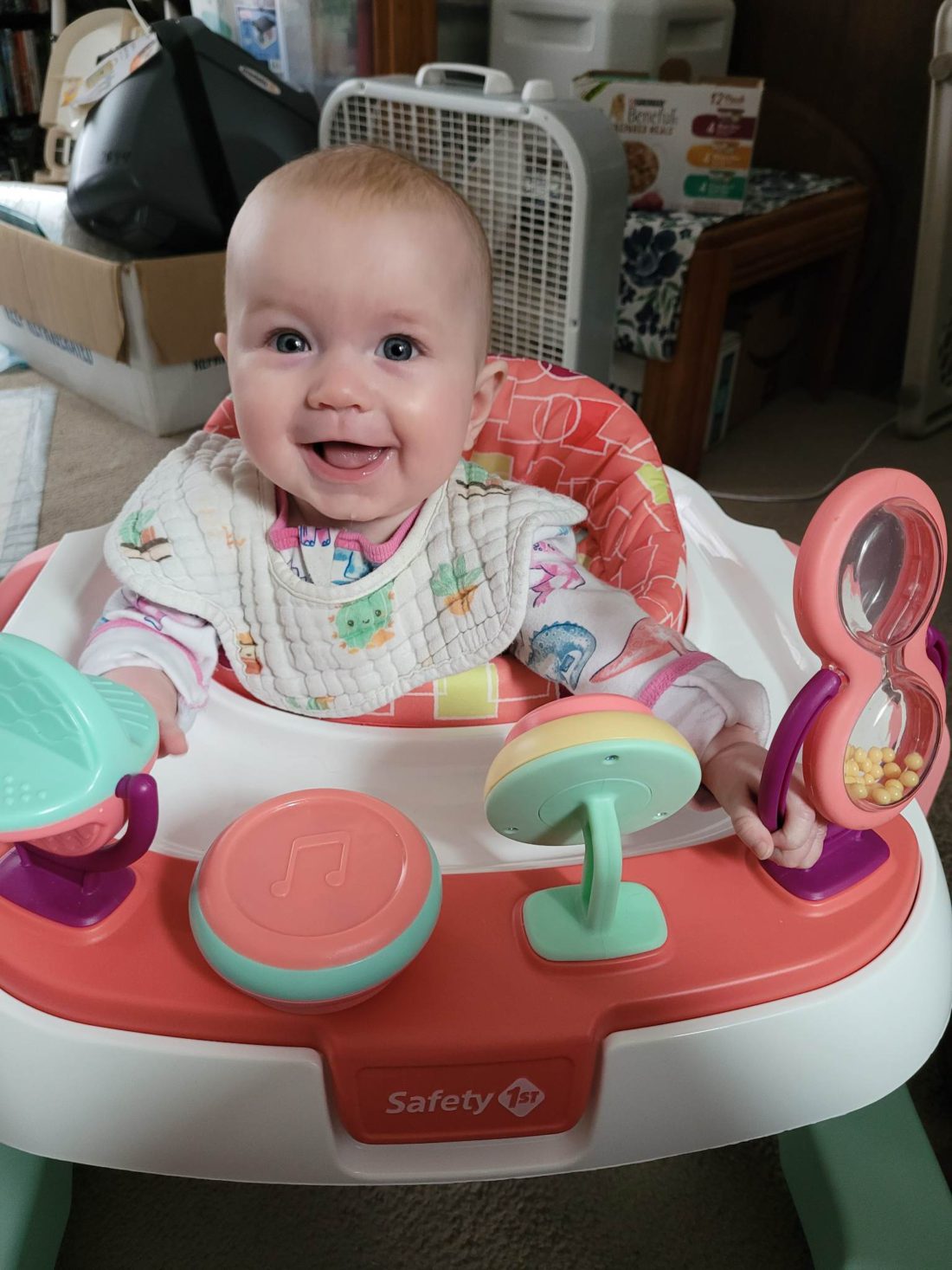Sophie Mullinax’s kids did not have a high-tech baby monitor or camera to watch them sleep. They don’t have a lot of toys that beep or buzz or play music. She encourages her 2-year-old and 5-year-old to play with objects around their home. Measuring cups from the kitchen and sticks from the yard can foster creative play, she says
“I don’t believe babies need a lot of stuff,” Mullinax tells Xpress.
Buying every new gadget or toy is an expensive way to live. It also creates more waste than some of Asheville’s environmentally conscious populace feel good about. Thus, parents like Mullinax are embracing the local sharing economy. It thrives in well-organized Facebook groups and on resale sites and apps, and local baby- and child-focused consignment shops where parents can purchase “preloved” items as well as recoup some costs by selling their items.
Heather Bardaville, owner of children’s secondhand shop Once Upon a Child, says reselling or sharing preowned kids’ items means “you’re doing something good for the environment as well as for the pocketbook and the community.”
Avoiding landfills
There isn’t reliable data about the amount of trash that children create; it varies based on caregivers’ choices as well as cultural norms. Still, the United States hovers among the top countries creating the most waste overall. According to the National Resources Defense Council, Americans are 4% of the world’s population but generate 12% of its solid waste.
Parents are conscious of their families’ contribution to this literal trash heap. Morgan Forsythe of Marshall, mother of a 6-month-old, laments the amount of trash packaging alone creates, especially Styrofoam and plastic wrap.
“My main goal is simply keeping things out of the landfill,” says Stephanie Woodson, mother of an 8- and 10-year-old. “I know the literal tons of stuff thrift stores try to process and love any opportunity to get stuff in the hands of someone who can use it instead of potentially shipping it off to be burned overseas.”
Mullinax tries to acquire items first through gifting — giving items for free — or shopping secondhand. “If we’re going to buy new, I try to source locally and try to buy a high-quality item that can be passed on to other people [for more use],” she explains.
Tatiana Rivest, mother of a 4-year-old, says she’s conscious of not buying fast fashion — which the blog Treehugger describes as mass-produced clothes that “aren’t built to last and quickly go out of style” — from big-box stories. Fast fashion has been linked to manufacturing that produces carbon emissions, puts toxins into water supplies and creates textile waste.
Rivest described the choice between buying a $4 shirt from a store like Target — which may be inexpensive because it’s been mass-produced — or spending that $4 on preloved kids’ clothes at a consignment shop. She opts for consignment as much as possible. (Rivest is the spouse of Xpress Managing Editor Thomas Calder.)
‘I buy very little brand-new’
As is common during a new phase of life, Erin Shadle experienced a rite of passage when she became pregnant with her first child: She made an Amazon wish list of baby supplies. “I had the giant Amazon registry of all the brand-new stuff for my kid,” Shadle recalls. As a new mom, she says, “I had no idea what I would actually use versus not use … so I got all the stuff new.”
Shadle knows she was “very lucky that most of my wish list items were fulfilled.” But over time, she noticed her household had acquired a lot of stuff. “I thought, ‘Hey, my kid’s outgrowing this stuff really fast — what am I going to do with it?” That’s when Shadle experienced another rite of passage as a parent whose home is awash in onesies, booties, crib mattresses and baby play gyms that her child had outgrown. She turned to Asheville’s sharing economy to find that stuff a new home.
Shadle says contributing to the sharing economy is important to her environmentally, as well as ethically. She is trained as a social worker, she explains, and she believes the community needs to share resources with one another.

Asheville’s parent community has numerous options for using the sharing economy online. In addition to Facebook Marketplace, which is for all-purpose sales, parents mentioned Asheville-specific groups Asheville Mamas (nearly 8,000 members), and Asheville Area Moms (over 6,000 members).
These Facebook groups rely on members to arrange porch pickups and drop-offs. Most items are free; others are sold at a discount. Forsythe says she usually gifts items to other parents with the belief she’s “paying it forward.” (Forsythe joined local Facebook groups for swapping kids’ stuff even before her child was born; she acquired parts for a breast pump, a bouncy seat and a jumper.)
Other parents use a group called South/West Asheville, which originated as a Buy Nothing group on Facebook. (Xpress was unable to connect with the group’s administrator.)
Shadle is now the mother of twins who arrived 2 1/2 years after her eldest son. She’s gifted many items from her original wish list, like a baby wipe warmer and clothes. Her younger kids wear their brother’s hand-me-downs, and all the children play with bikes and outdoor toys their mom snagged from the sharing economy.
“I buy very, very little brand-new for them,” Shadle says.
Thrifty choices
Mullinax says she’s had success buying kids’ items secondhand on eBay and Kidizen, a site for gently used clothes and shoes for babies up to teenage years. And Woodson praised a nationwide Facebook group that “focuses on rehoming hiking gear for outdoorsy families — hand-me-downs that you just pay shipping for.”
Mullinax also tries to shop at consignment shops so she is “keeping those dollars local.” She’s a fan of The Littlest Birds in West Asheville, which sells consigned items in addition to new merchandise, and Children’s Trading Post, an upscale consignment shop in Arden. Shadle has found good deals at Seeds and Sprouts in Fletcher.
Rivest praised the local franchise Once Upon a Child for being “so organized, so cheap … like a glorified Goodwill.” (She also shops at Goodwill, she says.)
Bardaville, who opened Asheville’s Once Upon a Child shop in 2022, says she used to throw away clothing or take it to Goodwill. But after she encountered another Once Upon a Child franchise, she “realized that I could take the clothes in, they would buy it, and I could put that toward what I was purchasing. … That saved a huge amount of money.” She estimates that she “went from spending $500 seasonally on my kiddo down to $150.”
Slowing the ‘tidal wave’
Touting frugality and environmentalism as her family’s core values, Mullinax says she embraces “lazy simplicity,” which she explains means “trying not to make a lot of work for myself.”
Rivest has focused a lot of her attention on slowing what she called the “tidal wave” of stuff, especially toys, that started when her child turned 1. She’s donated a crib “that was used twice,” a walker, a highchair, bikes, scooters and a Pack n Play portable crib.
Rivest draws inspiration from the YouTuber The Minimal Mom, whose videos teach families strategies for decluttering and organizing. The YouTuber explains that kids’ stuff “is all inventory that you have to manage,” Rivest says, and cleaning and organizing eats up time that parents might use to do something else.
To get her child in on the minimalist lifestyle, Rivest invented a game called “Keep or Donate.” They go through items together and decide what to keep playing with and what can be passed on to other kids.
Getting control of birthdays
Parents can stem the influx of toys to a certain extent, but inventory control becomes trickier around birthdays and holidays, when eager grandparents, aunts and uncles seize an opportunity to buy gifts.
Rivest says she’s seen lots of discussions in the Asheville Moms Facebook group about how to throw birthday parties or celebrate holidays and ask guests not to bring gifts without appearing rude. A lot of commenters, she explains, “worry about upsetting the grandparents.” Still, she’s seen ‘Please, no gifts. Just bring yourself’ on birthday party invitation and decided to try it for her child’s fourth birthday. The request mostly worked — some guests had already purchased gifts — but her child still had a happy birthday.
Other parents are explicitly asking for gifts of experiences or money for their children instead of stuff.
“For [her child’s] birthday and for Christmas, we always ask for experiences instead of toys,” says Michaela Bardossas, mother of a 2-year-old, noting the family’s annual pass to the WNC Nature Center. “That’s something I ask for every year because he loves going to see animals.” She says passes to indoor gyms for kids and play centers also make great gifts.
Forsythe’s 6-month-old is the first grandchild in the extended family, who are generous with gifts. She acknowledges her child is “very lucky.” However, she’s suggested that loved ones contribute to a savings account or buy a savings bond instead. Instead of receiving duplicate toys, she hopes her child could begin to grow “a good little nest egg” for the future.






Before you comment
The comments section is here to provide a platform for civil dialogue on the issues we face together as a local community. Xpress is committed to offering this platform for all voices, but when the tone of the discussion gets nasty or strays off topic, we believe many people choose not to participate. Xpress editors are determined to moderate comments to ensure a constructive interchange is maintained. All comments judged not to be in keeping with the spirit of civil discourse will be removed and repeat violators will be banned. See here for our terms of service. Thank you for being part of this effort to promote respectful discussion.